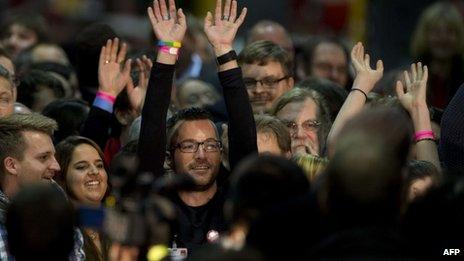Germany: Social Democrats back 'grand coalition' with Merkel
- Published

Almost 80% of party members took part in the postal vote
Members of Germany's opposition Social Democrats (SPD) have voted overwhelmingly in favour of entering a grand coalition government led by centre-right Chancellor Angela Merkel.
Seventy-six per cent of party members who voted approved the plan.
A new government can now be formed - three months after a general election.
The ҙуПуҙ«ГҪ Berlin correspondent says there are unlikely to be any big changes in government policy, although the SPD has already negotiated a minimum wage.
Under a coalition deal signed last month, a minimum hourly rate of 8.50 euros (ВЈ7.11; $11.55) will come into force for the first time in 2015.
Our correspondent, Steve Evans, says the SPD will be a minority part of the government and no-one doubts that Chancellor Merkel will be in charge.
Her Christian Democrats won an unprecedented victory in September's elections but fell just short of an absolute majority in parliament. Their traditional coalition partner, the Free Democrats won no seats, forcing Mrs Merkel to seek a new coalition partner.
The coalition is to make formal announcements about the cabinet on Sunday but media leaks revealed many of its most prominent members, AFP news agency reported.
The all-important finance ministry is thought likely to stay with Wolfgang Schaeuble - the previous finance minster who drove through the tough conditions on bail-outs of euro-zone countries in difficulty.
The SPD ballot paves the way for parliament to re-elect Mrs Merkel on Tuesday.
Mrs Merkel's conservative CDU/CSU signed a 185-page agreement with the SPD entitled "Shaping Germany's Future" in November.
Mrs Merkel spoke afterwards of "mutual trust" while SPD leader Sigmar Gabriel said it was a fair deal.
She said the coalition would stand for "solid finances, secure prosperity and social security" and oppose a "debt union" in Europe.
- Published27 November 2013
- Published27 November 2013
- Published24 September 2013